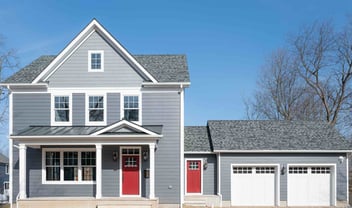4 Min Read
Buying Large Properties for Your Home Build
Buying land to build your custom home in New Jersey might not be as straightforward as it may seem. It’s a multifaceted process with important considerations about finding land, financing the purchase, and knowing what to look for to ensure it’s a promising investment. Andrew Giannattasio of GTG Builders is going to walk you through the entire process of purchasing land to set you up for a successful custom home-building experience.
Watch the video or keep reading!
What Is the Difference Between Buying Rural Land and Land in Town? Here’s a Summary:
Buying Land in Rural Areas
In more rural areas, most are looking at land that’s between five and ten acres in size. Often, this type of land isn’t developed, or improved, and lacks connection to public water and sewer systems. To Improve land, you’ll need to include this in your budget to cover all permits and fees associated with the necessary services, such as a licensed well driller. Large plots of land may have topographical obstacles that will also need to be addressed to prepare the land for a custom home.
Buying Improved Land in Town
Land that is improved will already be connected to city utilities, like power, water, and sewer. Buying improved land simplifies the process for your home builder to prepare for a custom home project. Several steps will have already been taken care of, reducing your custom home's final cost, as well as making it easier to secure a loan to purchase the land.
Taking a Closer Look: Buying Large Property
How Much Land Do You Need?
Are you just looking for space to spread out or are you looking to create a hobby farm? Knowing why you’re interested in a large plot of land can help you figure out how much space you need. Going for the largest plot of land you can find might sound dreamy, but there are important factors to weigh.
Maintaining a large property is a lot of work and you may need to hire help if you won’t have enough time to do it yourself. Also, larger plots may have creeks, ponds, and other features that you’d have to plan around. Finally, larger plots will require more of an investment in removing trees, laying a driveway, and connecting to utilities.
If you’re hoping to buy a large plot of land to subdivide it for more than one home, chances are you’ll be restricted from doing so.
With these considerations in mind, make sure the size is manageable but you have enough room for the lifestyle you’re envisioning.
How to Find Your Perfect Large Piece of Property
There are a few avenues you can take to finding your perfect property: a real estate agent; online search tools; a custom home builder; and, scouting around in person. Ideally, you’ll be exploring at least two of these at one time for efficiency.
Local Real Estate Agents
Local real estate agents will have locations, prices, insider information about the property, area information, and the history of the property. An agent will also likely have industry networks that can give you access to a builder with experience working with large rural properties, which is very important. They will be able to tell you about building restrictions, whether the property is available for water and power hookups if the property is in a floodplain and the like.
Custom Home Builder
However, don’t make an offer on a piece of property until you involve a builder who can uncover possible complications with the property. There may be issues with the soil or exorbitant costs associated with improving the land, like tree removal and excavation. A skilled builder will also be able to help you find solutions that work with your budget or find a different property that doesn’t require the same level of preparation.
Online Tools
Many websites specialize in large property listings. LandWatch, LandCentury, Land and Farm, and government real estate sales are just a few options. As with the prior two methods, be sure to involve a professional before putting an offer on any land you find, no matter how tempting.
Scouting for Land on Your Own
Sometimes, expressing interest in buying a property that isn’t actually for sale is enough to move a property owner to consider selling. If you’re already familiar with the area you’re interested in, you’ll have a leg up on researching the area to know where you’d like to be in proximity to amenities, like a grocery store.
Don’t Buy Raw Land Before Knowing The Potential Pitfalls
This is an important note and why it’s been touched on several times already. The property may look flat and near ready for a custom home as it is, but without a skilled eye, there could be a lot below, or above, the surface you’re not seeing.
Site improvement can get rather expensive depending on the condition of the land, so it’s important to involve a builder right away. Without a septic system, public water access, and power, your builder will have to acquire permits and hire professionals to install these important features.
You’ll also need to consider what type of power system you’d like to use on your property for lighting your home, cooking, and everything else. All electric, a mix of solar and electric, geothermal, natural gas, and propane are all solutions you can discuss with your builder.
The land itself will also need to be heavily assessed. How much excavation and fill will be needed? How many trees will need to be removed? Do any bridges need to be built to access the road? What kind of zoning ordinances are in place? What kind of smaller buildings, a detached garage, or workshops could you build on the property?
How Does Financing a Property Purchase Work?
Unfortunately, securing a loan to purchase raw land is more difficult than an improved lot. The risk a lender would take in financing your loan is due to the unknowns that come with this type of land and the cost-prohibitive measures it would take to prepare it for a custom home.
If paying for the land in cash is an option, that’s ideal. It will also make getting approved for a construction loan easier. However, not everyone has cash on hand, so you could seek a land loan, which may be classified as a commercial property loan. The interest rates will be higher and the lender may want to know the details about what you intend to do with the land. The more developed your plan is before approaching a lender, the higher your likelihood of getting approved for a loan will be.
Find an Experienced Builder for Your Potential Large Property
To begin with, improving a large piece of property incorrectly or not planning properly can have a ripple effect on other planning issues. An experienced home builder can efficiently assess and problem-solve to make sure your potential large property is prepared for your dream custom home.
At GTG Custom Home Builders, we will assess your land and hand you a comprehensive summary of everything your land will need to be ready for a custom build before you purchase the property. We understand the importance of being prepared to avoid any unfortunate surprises. We take pride in every custom home we build, so we work diligently to ensure the property your home will sit on is up to our standards. To find out more about finding a large property in New Jersey for your custom home, contact us and we’ll be happy to help you navigate your journey.


.jpg?width=352&name=7BFC28B9DF5ACDC9BDCEF660854775DE%20(1).jpg)

